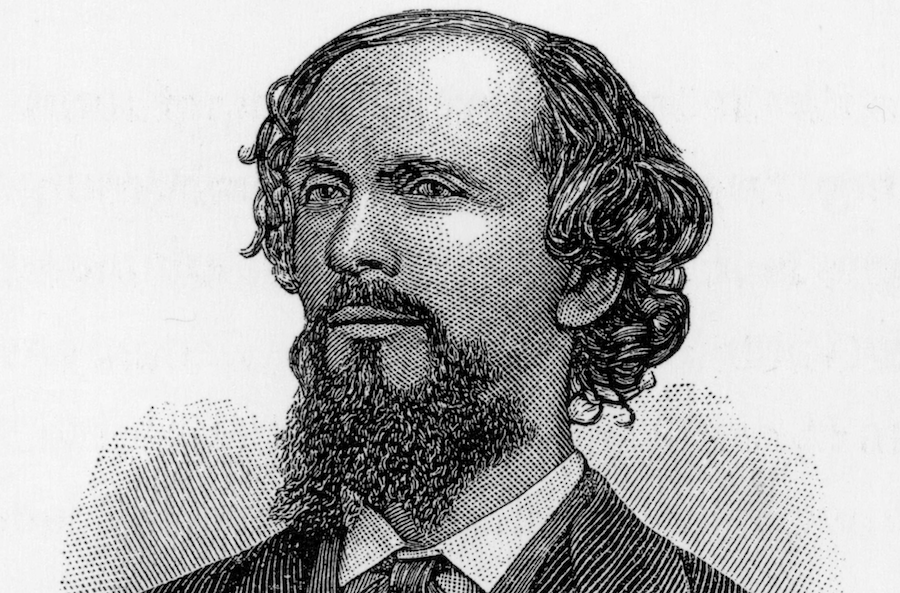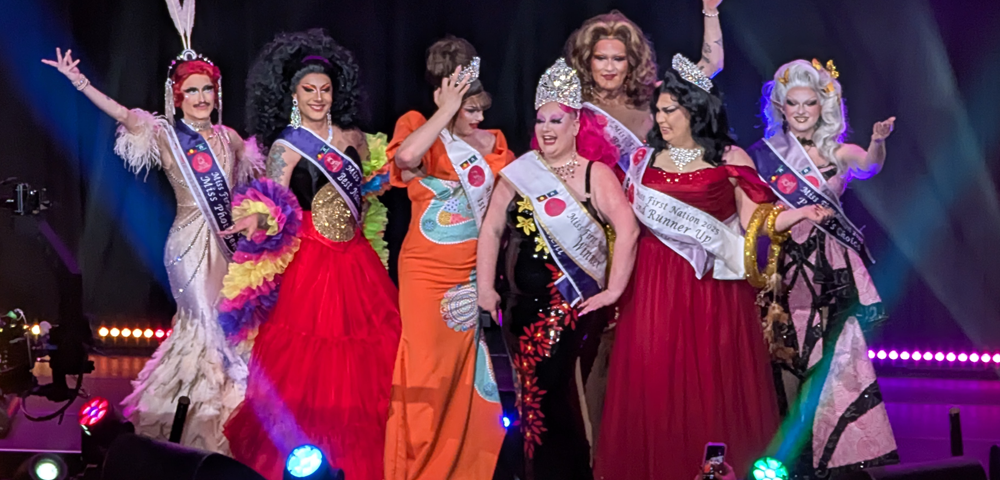

He’s the most important gay activist that you’ve never heard of. 165 years ago, German lawyer Karl Heinrich Ulrichs became the first person to come out. He would go on to identify LGBTQI people as a class of people for the very first time, to publicly campaign for our rights, and to insist we were “born this way.”
His story is largely unknown in the English speaking world, though we still live with his legacy every single day, Andrew M Potts reports.
In 1854, Karl Heinrich Ulrichs confessed his same-sex attraction to his brother in-law.
The subject of conversation was quickly changed but Ulrichs was undaunted. It was a small action that would have momentous consequences that would ripple through time.
In doing so he had made history, identifying himself as a naturally same-sex attracted person. Not just someone who engaged in a behaviour or a vice or a sin, but as someone with an identity.
By 1862, he was out to his whole family, discussing his theories about sexual orientation and gender identity in group letters to his relatives.
Despite their religiosity, they were open minded and did not reject him, with one uncle even writing back to encourage his inquiries in this area.
That same year he began self-publishing his ideas in a series of pamphlets, at first under the pseudonym Numa Numantis, having given up on trying to have his ideas published in the German press.
Over nearly two decades of activism, Ulrichs would identify all of the fundamental rights and issues that we still fight for around the world today – the right to marry, the right to form a family, to have sex lives, to live in our gender identity, and the right to find accommodation and work without discrimination, and to be free from violence.
He would even touch on intersex issues, as he found them compelling evidence for the variety and inborn-ness of sexual and gender diversity among natural human beings.
He began his quest from a point of comical naivety, knowing no other gay men. But by examining his own feelings and speaking to others he would eventually develop theories about sexuality and gender identity that still resonate today.
NOT LIKE OTHER BOYS
Ulrichs was born to a middle class family in Hanover on August 28 of 1825.
An effeminate child, he was not into roughhousing and was bullied at school, and his mother would often sigh, “Oh Karl, you are not like other boys!”
At age nine, he recorded his first infatuation with a boy two or three years his senior, Eduard d’H.
Ulrichs convinced Eduard to come to his tenth birthday party but his architect father fell into a pit while surveying a building, and died four days before his birthday so the party was cancelled.
The family moved to Burgdorf the following year, where Karl’s grandfather was the local church superintendent, but Eduard wrote him a going away letter that he treasured for many years after.
Karl was close to his “good grandfather” who would accompany him for long walks to pick flowers and he remained connected to his faith throughout his life.
Indeed, when he finally addressed the issue of same-sex marriage, he believed that it was the church that should perform them in order to encourage law reform by the state.
As he grew older, Ulrichs began to feel drawn to the athletic male bodies of the Greek statues he saw in his text books and to the young soldiers on patrol around his town.
At 18, he wrote a poem to a male sweetheart, recording, “Oh how happy I was at your side! How we embraced so snugly, wandering under boughs, as evening’s twilight fell.”
A year later, he was studying among the handsome students of the University of Gottingen.
But although the French had decriminalized homosexuality in much of Germany following the Napoleonic Wars, acting on his feelings would have killed his reputation in the small university town, though he recorded his attraction to a group of forrestry students who attended a students ball during this time.
Ulrichs wrote that he “suffered real torture, gripped by the memory of those beautiful men.”
Two years later, and Ulrichs transferred to Berlin, where the cover of a bigger city allowed him to finally act out his sexual longings, meeting covertly with other men.
In 1848, Ulrichs graduated with a law degree and befriended August Tewes, a heterosexual lawyer who would become his closest ally in his campaign for the rights of LGBTQI people in Germany.
THE GERM OF AN IDEA
By 1854 we know that he had come to the conclusion that his attraction to men was inborn and natural.
Around this time it appears his superiors began to suspect his sexual orientation and he left his career as a jurist and assistant magistrate to become a journalist, writing for some of Germany’s largest newspapers.
By 1862 he had become convinced that if homosexuals (though the word would not be coined for another seven years) were inclined by nature to be attracted to men then the law should police their relationships no differrently than they did heterosexual relationships.
Ulrichs penned two booklets, which soon grew to five, collectively known as his Researches on the Riddle of love between Men, and he would eventually self-publish twelve volumes over a decade, in print runs into the thousands, before the money dried up.
Through these booklets he began to explain his theory of “the third sex.”
He believed homosexuals, who he gave the name “Urnings” (in English, “Uranians”) were the result of a female consciousness being born into a male body.
He thought such individuals numbered perhaps one in every 500, but later came to realize there were much more numerous.
Ulrichs chose to use the word “Urnings” as the term that was typically used to describe sex between males at the time in Germany was “boy-love” and he thought it was important to distinguish his orientation from people who were orientated towards child abuse.
Having only very limited experiences speaking to other gay men, Ulrichs believed all Urnings to be effeminate and by nature attracted to heterosexual men.
The idea that the masculine men and the rough trade he met in parks could be gay or bisexual and just in the closet did not occur to him until much later, although he would later accept that Urnings could love each other and be masculine in character.
At this early, naive stage, Ulrichs, thought that if anyone was to be punished for sex between men, it was the heterosexual man who chose to turn to an Urning for release.
Essentially, he wanted bottoms to be decriminalised while tops would remain illegal. It was an idea that was in much need of refining.
“It is a fact that there are individuals among us whose body is built like a male, and, at the same time, whose sexual drive is directed towards men, who are sexually not aroused by women,” he wrote in his first booklet, Vindex.
“Several thousands of Urnings are living in the cities and in the countryside of the lands called Germany. They comprise the upper and lower classes, are in every occupation. There are millions of them all over the world. Urnings have existed in all areas, in antiquity … [even] among animals.”
“No father is sure if the germ of this orientation is latent in one of his sons and if it will break through at puberty.”
Ulrichs was adamant that there was nothing unnatural about being same-sex attracted, even if such individuals were in the minority.
“When I love the person I am naturally attracted to, I am not acting contrary to nature,” he wrote.
“When I, as an Urning, fall in love with a mature and handsome young man, I am not acting contrary to nature.”
“We are not eunuchs. Nature gave us, like you, a sex drive … Who, I ask, gave you the right to order us not to love … ?” he wrote, addressing his heterosexual readers
From a very early stage in his writings, Ulrichs presented extremely detailed legal and scientific evidence for the naturality of homosexuality.
He noted that a human fetus remained genitally ambiguous until twelve weeks into a pregnancy and pointed to intersex people, postulating that the mental gender and physical sex of a person could be governed by separate processes that could result in a person having a sex and gender that were incongruous to each other.
Police raided his printer in 1864, confiscating nearly all copies of his first pamphlet, but the second had already been posted.
Six days later a judge threw out the charges against him and ordered all the copies to be returned to Ulrichs.
CONTRADICTIONS AND AFFIRMATIONS
These first booklets led to a flood of letters to Ulrichs, via his publisher, from gay men all over Germany who spoke about their experience of homosexuality.
Many wrote to praise him for giving them a voice, while others wrote to contradict his views and with time Ulrichs revised his theories based on his correspondence with other gay men.
In his next booklets, he wrote of lesbians and of heterosexual men who displayed feminine characteristics, envisaging a spectrum of gender and sexuality that American sexologist Alfred Kinsey would strike upon nearly a century later.
He also proposed the creation of an “Urning Union” to fight for their protection and deliver mutual aid between them.
Its goals were to be to bring Urnings out of isolation and unite them; to vindicate their equality with heterosexuals before the law and society; to produce Urning literature; and to assist Urnings who suffer because of their nature.
The group would be open to any Urning of honourable character.
Ulrichs sent bylaws for the group to his regular correspondents, but there is no evidence that the group was ever active.
Ulrichs also began sending his booklets to politicians, doctors and lawyers, including judges trying sodomy cases.
But Ulrichs was about to ratchet his activism up a further notch with a return to the law, and he enlisted the help of his heterosexual lawyer friend August Tewes in the task.
Together they penned a resolution, “That inborn love for persons of the male sex is to be punished under the same conditions under which love of the female sex is punished,” to be presented at the Association of German Jurists, the top legal fraternity in the German Confederation.
The resolution was excluded from the agenda on their first attempt but, undeterred, on August 29, 1867, Ulrichs and Tewes returned to speak.
Although nearly drowned out by their audience, Ulrichs was able to read out his proposal, “[addressing] the revision of the existing material penal code, especially the final repeal of a specific unlawful paragraph … handed down to us from past centuries.”
“It is directed at abolishing this paragraph of the penal code which discriminates against an innocent class of people.”
“It is also a question of the establishment of a unified law in Germany … Bavaria and Austria both presently condemn prosecution, and their law stands diametrically opposed to the rest of Germany.”
“Finally it is a matter … of cutting the source of abundant suicides, especially of the most shocking sort. I believe these are very worthy, serious and important questions concerning the penal code and ones that the association of German Jurists would rightfully and properly be called to rule on.”
At this point his audience began to realise what he was discussing, but he pressed on despite the growing clamour.
“… This group of men who are discriminated against on no other ground for unjust criminal prosecution other than Nature, which creates and governs mysteriously, have implanted in this group a sexual nature that is inconsistent with the common one.”
Hearing these words, the room exploded, and the president of the association ordered Ulrichs to speak in Latin if he continued, but Ulrichs had done enough. He had become the first man in modern history to call publicly for gay tollerance and law reform and having tabled his speech, it was now in the official record.
In 1868, Ulrichs went the further step of publishing a booklet with his full name emblazoned on the cover and he was soon so well known that his books were being reviewed in medical journals, and even Karl Marx and Friedrich Engels, the authors of the Communist Manifesto, had heard of him. They were not fans to say the least.
“The Urning [book] you sent me is a very curious thing. These are extremely unnatural revelations,” Engels wrote to Marx in 1869.
“The pederasts are beginning to count themselves, and discover that they are a power in the state. Only organisation was lacking, but according to this source it apparently already exists.”
“It is a bit of luck that we, personally, are too old to have to fear that, when this party wins, we shall have to pay physical tribute to the victors.”
“Then things will go badly enough for poor frontside people like us, with our childish penchant for females!”
Ulrichs’ books were soon being read as far afield as Russia and the United States and he could name twenty prominent Germans who had voiced their support for his call for law reform — and all of them non-Urnings.
Further booklets followed, and Ulrichs began to involve himself as an expert witness in trials of gay men, writing to judges and educating defense lawyers on his theories and possible legal defenses.
When blackmailed gay theatre director Fritz Feldtmann was put on trial after being denounced by an actor, he took inspiration from Ulrichs when he spoke in his own defense.
“Just as you my judges have a right to love women, so too I have a right to love men,” he told the court.
“Both of us have this right from God … You may have the power to condemn me, but I must dispute your right to do so.”
Feldtmann was sentenced to a year in prison but the homosexuals were now speaking up for themselves.
Ulrichs ideas were increasingly being accepted by mainstream psychiatry in Germany, which increasingly viewed homosexuality as a condition that was inborn – if still a sickness.
In 1870, Ulrichs published what he intended to be the world’s first gay magazine, Uranus, though plans for a second issue failed and he republished it as another booklet, renamed Prometheus.
However the public mood was changing after a series of shocking murders were blamed on gay men in the tabloids, and when the Franco-Prussian War broke out, the smaller German states fell into line behind Prussia to form a united Germany under Kaiser Wilhelm I who extended Prussia’s Paragraph 175 law, later used to persecute homosexuals by the Nazis, to the whole of Germany.
Ulrichs published his final booklet, Critical Arrows, in 1879, then walked over the Alps into Italy with his spirit broken, eventually settling in the mountain town of Aquila where he lived for 12 years before his death on July 14 in 1895.
AN ENDURING LEGACY
Sadly, Ulrichs would never learn of the global LGBTQI rights movement he would inspire.
In his own lifetime, Ulrichs was a direct inspiration for Karl Maria Kertbery, the man who would coin the term “homosexual” in 1869, writing a pamphlet of his own that began the medicalisation of homosexuality.
Medicalisation would come with cruel attempts to cure homosexuals but it would also provide a basis to argue against criminalisation.
Ulrichs’ writings would also inspire the pioneering German sexologist, Magnus Hirschfeld, who two years after Ulrichs’ death founded the world’s first LGBTQI rights organisation, the Scientific Humanitarian Committee.
In 1921, the group held its First Congress for Sexual Reform, leading to the formation of a World League for Sexual Reform that aimed to take the fight for justice global, and by 1932, congresses had been held in England, Denmark, Czechoslovakia and Austria.
However, in 1933 Adolf Hitler and the Nazi Party took control of Germany and Hirschfeld, who was both Jewishn and gay, died in exile in France in 1935.
The black and white footage of the Nazi book burnings that you see in documentaries is of the library from Hirschfield’s Institute for Sex Research which operated as a virtual embassy for the pan-European movement to decriminalise homosexuality that was snuffed out when Hitler came to power.
Following World War II, gay American military personel who had been stationed in Germany returned home after learning of this gay world that had existed before the war.
Some of these soldiers were among the earliest members of the pioneering American gay rights group the Mattachine Society which formed in 1950.
One of these was Frank Kameny, who co-founded the Mattachines’ Washington DC chapter in 1961 after being fired from his job as an astronomer with the US Army Map Service in 1957 when his bosses discovered he was gay.
Members of the Mattachines were debating the issue of same-sex marriage as early as 1959.
During the 1960s they were openly picketing state capitols and the White House and were being interviewed on American television under their real names as early as 1964.
The Mattachines would inspire the first generation of activists who would label themselves ‘gay’ and form the modern LGBTQI rights movement of the post Stonewall period that we know today.
Stonewall, in 1969 would, in turn, inspire Sydney’s first Mardi Gras in 1978 and the Star Observer was launched a year later.
There is a direct line running through history from Karl Heinrich Ulrichs’ pioneering work in the 1860s in Germany all the way to this very moment that you are reading these words, dear reader, and in a very tangible way we all have him to thank for beginning the fight for the rights and freedom to love that we enjoy today.
Ulrichs message to the world is best summed up in his booklet, Araxes:
“The Urning, too, is a person. He, too, therefore has inalienable rights. His sexual orientation is a right established by nature. Legislators have no right to veto nature; no right to persecute nature in the course of its work; no right to torture living creatures who are subject to those drives nature gave them.”
“The Urning is also a citizen. He, too, has civil rights; and according to these rights, the state has certain duties to fulfill as well. The state does not have the right to act on whimsy or for the sheer love of persecution. The state is not authorised, as in the past, to treat Urnings as outside the pale of the law.”
“Just because Urnings are unfortunate enough to be a small minority, no damage can be done to their inalienable rights and to their civil rights.”
“Legislators should give up hope … of uprooting the Uranian sexual drive at any time. Even the fiery pyres upon which they burned Urnings in earlier centuries could not accomplish this. Even to gag and tie them up was useless. The battle against nature is a hopeless one. Even the most powerful government, with all the means of coercion it can bring to bear, is too weak.”










Wrong: Ulrichs was not the first. Contemporary with him was Karl-Maria Kertbeny, the man who coined the term “homosexual” and “hetersexual.”
Before either of them was Heinrich Hössli who wrote a two volume work defending gays published in 1836.